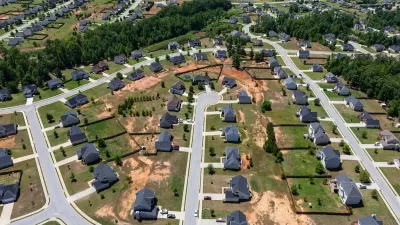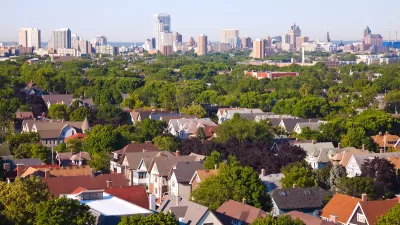Proposed changes would create more room for mid-density housing and shift away from single-family homes on large lots.

In an article for Towers, James Rambin outlines proposed zoning changes in Austin that would reduce minimum lot sizes and alter the single-family zoning that has dominated most of the city’s residential areas to allow for more ‘missing middle housing’ types.
As Rambin explains, “Austin’s 1980s land development code imposes a minimum lot size of 5,750 square feet for homes built under the single-family zoning regime that dominates the vast majority of the city’s available land.”
Now, a resolution before the city council “proposes amending the code to reduce the minimum lot size in single-family zones to 2,500 square feet or less ‘so that existing standard-size lots can be subdivided, and be developed with a variety of housing types such as row houses, townhomes, tri-and four-plexes, garden homes, and cottage courts.’”
The resolution also asks the City Manager to develop proposed amendments to other zoning rules such as “setbacks, height, impervious cover, floor-to-area ratio, building cover requirements, and other tweaks like only imposing the city’s McMansion Ordinance on projects that intend to construct a single home on one lot.”
While Rambin believes these changes should have been implemented decades ago to prevent the current housing crisis, “these code tweaks are a major step in the right direction.”
FULL STORY: Austin Finally Faces Down the Housing Crisis With Single-Family Zoning Reform

Planetizen Federal Action Tracker
A weekly monitor of how Trump’s orders and actions are impacting planners and planning in America.

Congressman Proposes Bill to Rename DC Metro “Trump Train”
The Make Autorail Great Again Act would withhold federal funding to the system until the Washington Metropolitan Area Transit Authority (WMATA), rebrands as the Washington Metropolitan Authority for Greater Access (WMAGA).

The Simple Legislative Tool Transforming Vacant Downtowns
In California, Michigan and Georgia, an easy win is bringing dollars — and delight — back to city centers.

DC Backpedals on Bike Lane Protection, Swaps Barriers for Paint
Citing aesthetic concerns, the city is removing the concrete barriers and flexposts that once separated Arizona Avenue cyclists from motor vehicles.

In These Cities, Most New Housing is Under 441 Square Feet
With loosened restrictions on “micro-housing,” tiny units now make up as much as 66% of newly constructed housing.

Albuquerque’s Microtransit: A Planner’s Answer to Food Access Gaps
New microtransit vans in Albuquerque aim to close food access gaps by linking low-income areas to grocery stores, cutting travel times by 30 percent and offering planners a scalable model for equity-focused transit.
Urban Design for Planners 1: Software Tools
This six-course series explores essential urban design concepts using open source software and equips planners with the tools they need to participate fully in the urban design process.
Planning for Universal Design
Learn the tools for implementing Universal Design in planning regulations.
Smith Gee Studio
City of Charlotte
City of Camden Redevelopment Agency
City of Astoria
Transportation Research & Education Center (TREC) at Portland State University
US High Speed Rail Association
City of Camden Redevelopment Agency
Municipality of Princeton (NJ)





























